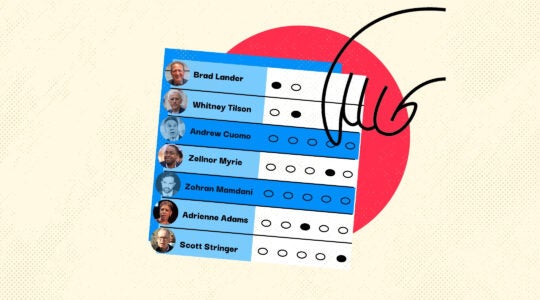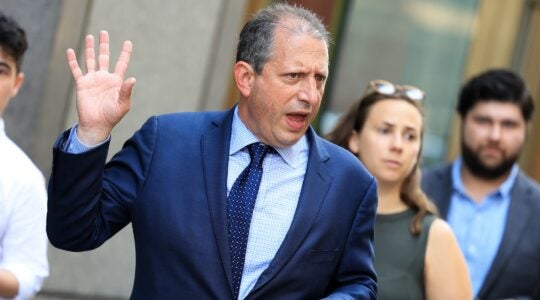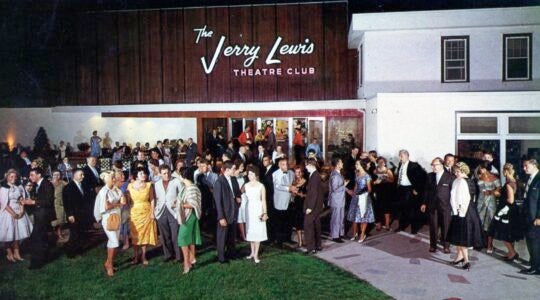The attempted assassination of a Jewish member of Congress from Arizona, Gabrielle Giffords, and the wanton killing of six others in Tucson on Saturday has revived the debate over whether Jewish communal and religious leaders are doing enough to combat a toxic political climate that many say threatens a new age of political violence.
The Tucson tragedy, which also resulted in the death of a congressional aide, a federal judge and a 9-year-old girl, could also put new pressure on Jewish groups that have largely abandoned the fight for tougher gun control laws — and, some say, the fight for social and economic justice.
“Thus far, the Jewish religious establishment has done virtually nothing to combat a political atmosphere that foments hatred and violence,” said Rabbi Joshua Hammerman, spiritual leader of Temple Beth El in Stamford, Conn., and a columnist for The Jewish Week. “The closest thing we’ve got to that right now is a civility campaign being organized by the Jewish Council for Public Affairs (JCPA). We need to go much further.”
Jewish groups have all but given up the fight for stronger gun control laws, he added, and the intensified focus on Israel has undermined the traditional Jewish emphasis on social and economic justice at a time when ongoing economic woes may be making Americans even more vulnerable to the tirades of talk show hosts and political demagogues.
On both issues — political incitement and the increasingly easy access to weapons of all kinds — the nation’s bitter partisanship has further muted the collective voice of the Jewish community.
“As 501(c)3s [tax-exempt nonprofits], we are very sensitive to the charge we are being partisan every time we speak up about these issues,” said a top leader of a national Jewish organization. “And frankly there is an element of intimidation, especially on the gun issue. Passions run so high, and people react so angrily when you raise these issues, that we tend to pull back.”
And Jewish leaders have retreated from the gun control fight because “the Democrats have essentially waved the white flag” on the issue, this activist said.
The brutal assault left Giffords, whose father was Jewish and who became committed to her Jewish heritage after a 2001 trip to Israel, fighting for her life — and shook the Jewish political community to its core.
“Gabby Giffords wears her Jewish identity on her sleeve — a conservative Arizona sleeve,” said Steve Rabinowitz, a top media consultant in Washington who grew up in Tucson. “I could care less when she first embraced Judaism or what the halacha is of her Judaism; she is among the most Jewish members of Congress I know, and I pray in shul for her recovery.”
While early reports drew connections between the alleged shooter, Jared Loughner, and extremist groups such as American Renaissance, at press time there was no evidence of a broader plot — or that anti-Semitism was a motive (there were also unconfirmed reports that Loughner’s mother may be Jewish).
Press reports paint a picture of a deeply disturbed, sometimes incoherent young man driven by a tangle of political ideologies linked only by their shared hatred of authority. His list of favorite books reportedly included both “Mein Kampf” and the “Communist Manifesto.”
An Anti-Defamation League analysis of Loughner’s writings “suggest someone who probably was not associated with any extremist group or movement, but who has a generic distrust of government and a vague interest in conspiracy theories,” said Abraham Foxman, the group’s national director.
Ascribing causation is difficult in cases involving both extremist ideology and mental illness, experts say. But there is little doubt that a national climate of unrestrained rage can trigger violence in those with emotional disorders, said Victor Schwartz, dean of students at Yeshiva University and a professor of clinical psychiatry.
Schwartz argued that “the fringe, intense communications by extremist groups can be appealing to those with psychiatric disorders. The feeling that things aren’t as they ought to be, that there are conspiratorial underpinnings and secret meanings that only the few can understand, can be very comforting to those who are vulnerable.”
And statements that are meant as political metaphors by politicians and entertainers — such as the image of a gun sight’s crosshairs — “may be taken as more concrete by those with psychiatric illnesses,” he said.
Schwartz did not attribute the Tucson massacre to aggressive talk radio, but he said it could be a contributing factor in fomenting political violence.
“Assuming there is a decline in civil discourse, for those who are hovering at the edge of holding their behavior together, if you increase their emotional temperature by two degrees, it may cause them to act and not just fantasize.”
*
The ADL’s Foxman has been sounding alarms about the nation’s toxic political mood for several years, and in the wake of the Giffords shooting “the fear has become the reality,” he told The Jewish Week.
Foxman described a climate of political intolerance across the political spectrum, but had especially harsh words for talk shows that have made unrestrained political rage “a popular form of entertainment.”
Some commentators suggest the appalling events in Tucson could be a turning point in the nation’s plunge toward an angry, unforgiving mode of political discourse. Foxman isn’t so sure.
“Will this shake people enough to the point where they think twice and realize that you have to be careful of what you say because there will be consequences?” he asked. “We can hope so, at least for a short period.”
Reversing a climate of incitement, he said, will require a new level of “moral leadership.”
“Some have spoken out in our own community, but I don’t think enough have made this an issue of major concern,” he said. “The fact that this tragedy hit our community inadvertently — we do not believe [Giffords] was targeted because she was Jewish — should encourage our moral and spiritual leaders to take this up.”
Simon Greer is president and CEO of the Jewish Funds for Justice, a progressive Jewish group that waged a fierce media campaign against commentator and talk show host Glenn Beck last fall.
In the wake of the Giffords shooting, Greer argued that talk show incitement is “a significant factor” in generating at least the potential for political violence. “You hear this rhetoric day in and day out, and it has to impact peoples’ way of thinking,” he said. “I’m hesitant to fall into the direct causality camp and say this piece of rhetoric led to that piece of violence. But we know from history that when hate speech goes up, some people will make the connection and act on it.”
The Jewish Council for Public Affairs (JCPA), is trying to do something about it. Last year the group launched a campaign centered on a “statement on civility” now signed by more than 1,500 Jewish religious and political leaders who pledge to “treat others with decency and honor and to set ourselves as models for civil discourse, even when we disagree with each other.”
Critics say that the JCPA initiative will be toothless without a willingness to call out those who are guiltiest of the kind of political incitement that may have been a factor in the Arizona shootings.
Rabbi Steve Gutow, the group’s executive vice president, said JCPA is now working on responsible ways to do just that, although the difficulties are enormous.
He said the group is using op-eds and working with clergy groups to advance the argument that political rage ultimately undermines democratic values.
What about naming the names of the worst inciters?
“That’s difficult. You have to have a general consensus, or it will be taken as partisan,” he said. “If you do that there will be a circling of wagons, and the talk show host may get even better ratings.”
But he said the group isn’t averse to talking to “boards of directors and the people who run [media] companies.”
Rather than become the self-appointed judges of what is civil and what is not, JCPA hopes to encourage activists across the spectrum to police their own political segments.
“Republicans need to speak to Republicans when they cross the line, Democrats to Democrats,” he said. “Part of our goal is to have that broad spectrum so we have people who are respected within their own worlds who can address these issues.” This week, Fox News head Roger Ailes implored his anchors to cut down on the overheated political rhetoric.
Rabbi Gutow said that the gun control issue, which was propelled back into national headlines by the Giffords shooting and the fact the alleged killer apparently had no trouble obtaining a sophisticated semiautomatic pistol despite clear signs of mental disorder, remains a strong JCPA interest.
But like other Jewish leaders, he conceded that the issue no longer has the priority it once had.
“There haven’t been a lot of calls for us to be engaged on gun control,” he said. “We can be engaged in only so many issues. I guess this points to a weakness in our community.”
JFSJ’s Greer sees a broader problem.
“Every time I hear the hateful rhetoric, I can’t help but think that we live in a country that’s stuck with unemployment at 9 percent … and we know dire economic conditions are the conditions in which hate speech takes root and begins to be manifested in actions,” he said. “The Jewish community was once a major stakeholder in the domestic issues facing the country. As I look around now, I just don’t see us at the table where these issues are being debated — with a few exceptions.”
The New York Jewish Week brings you the stories behind the headlines, keeping you connected to Jewish life in New York. Help sustain the reporting you trust by donating today.




